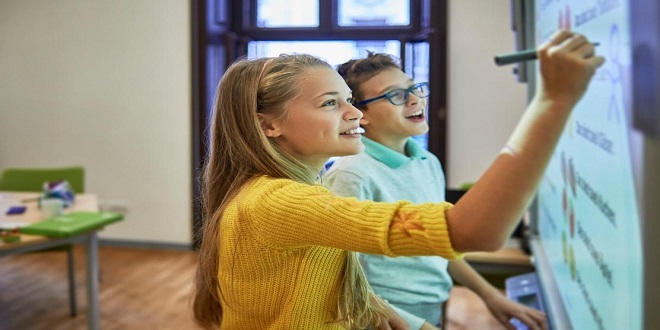Technology is changing the world around us much faster than anticipated, and many people are concerned that it could replace human intelligence. Some educators are worried that technology may take up all the tasks, so there may be nobody to teach in the future. However, education is here to stay. It may change its form, but it can never disappear entirely from the face of the world. A few decades from now, teachers and instructors will have more advanced methods of teaching and teaching aids. Below is a review of the aspects that define the future of education:
Technology forward
Education and teaching infrastructure have transformed over time as new technologies have been invented. From the chalkboard to the whiteboard and now the SMART Board, there will certainly be new innovations in the future. In the coming years, each learner will have technology devices both in school and at home. Class assignments will be posted on Cloud computing platforms such as Google Classroom or Blackboard.
For those with teaching aspirations who may be looking to pursue an online Master’s degree in Education, such as the one offered by the University of Exeter, the curriculum will provide you with insight into the modern technology that is used in teaching.
Some schools are already implementing technology, but the future is definitely going to be interesting. Learners will use Augmented Reality (AR) to delve into their favorite subjects and explore various elements without performing experiments.
Virtual classrooms
Although there was already a conversation around virtual classrooms, the Covid-19 pandemic pushed it further. Students were confined to their homes and studied through various online means, including Skype and Zoom. Hundreds of schools in the United States have already adopted this learning model after realizing that it is viable. It is also cost-effective because teachers and students do not have to spend money commuting or paying for accommodation around schools.
In the future, there are likely to be stand-alone virtual schools with teachers working remotely with students through an online learning curriculum. Virtual learning is flexible as it allows students to complete courses from their favorite environments.
Personalized learning
The current education system is uniform, subjecting learners to similar opportunities despite their varied capabilities. Although some schools have tailored education depending on student abilities and interests, it is only on a small scale. The coming years will see widespread personalized learning where bright students are exposed to more difficult challenges and questions.
On the other hand, students who require more time to master important concepts will receive additional support. However, this does not imply that future education will allow students to evade responsibilities. It will be designed to build every learner’s potential through positive reinforcement of the learning process. In this way, even poor performers will gain confidence in their academic abilities. Personalized education will create a platform where teachers can engage such learners and help them improve.
Project-based learning
The education system is likely to change as educators adopt a project-based learning system to support young innovators and inventors. This structure seeks to develop students’ skills and knowledge through projects. These projects will take various forms. For instance, learners may be presented with a challenge, problem, or question for them to investigate and come up with solutions within a specific period.
This system is ideal for preparing students to be more creative and innovative. Schools have already begun integrating project-based learning into their curricula. Part of the infrastructure that innovative schools will develop is creativity spaces that will promote an immersive learning environment.
Data interpretation
Currently, mathematics is listed among the three literacies. It is anticipated that its manual aspect will become obsolete in the future. The spread of computer technology will take over data and statistical analysis to predict future trends. Humans will only be required to interpret the data, and this is the only part that will be covered in the curriculum. Mathematical literacy will be anchored upon theoretical knowledge and the rationality of humans to discern trends and logic.
Exams to change completely or disappear
Administering exams is the current means to measure the competencies of students. It involves a question-and-answer format which will certainly become irrelevant in the future. Schools will develop courseware platforms to assess learners as they advance from one stage to another.
Many educational experts argue that exams only prompt students to cram materials and forget everything as soon as they submit their exam papers. A student will therefore record exemplary results in the exam but fail to perform in their job placement. Courseware platforms will be used to assess the factual knowledge of learners through their performances in various projects.
New content areas could emerge
Apart from math, literacy, social studies, and science have been the center and focus of education since it became formalized. In the face of a heavily connected world and technological advancements, new perspectives will definitely emerge. Education stakeholders will be forced to adopt new criteria to unify learning experiences. They will not focus on single content areas. This doesn’t mean that traditional content areas should be eliminated; rather, various themes will need to be rebranded and made more robust.
Widespread homeschooling approach
Students in the future will be exposed to an individual approach to education which goes hand in hand with homeschooling. Learners will have a say in what they want to study and have the opportunity to choose a favorable time frame. They will learn while enjoying the freedom to associate with family and friends and also attend to their spiritual needs.
Remember that the school environment is full of anti-social behavior, including bullying, competition, and negative peer pressure. Homeschooling will eliminate all of these as the students will be taught from the comfort of their homes. Many learners in first-world countries have adopted this system already, which is an indication that other parts of the world will follow suit.
Conclusion
Education is a critical pillar of socioeconomic development. It is one of the oldest phenomena that has contributed to the growth of societies. Over time, it has transformed to take various forms based on the technology of the moment. As time goes on, more technological advances are shaping the world. There is no doubt that there are better things ahead, and education will be more fulfilling in the future. Learners will find a better platform to acquire knowledge that will provide solutions to emerging global problems and help to build their livelihoods.
 Jobsearchdone.com Top News Share Website
Jobsearchdone.com Top News Share Website




